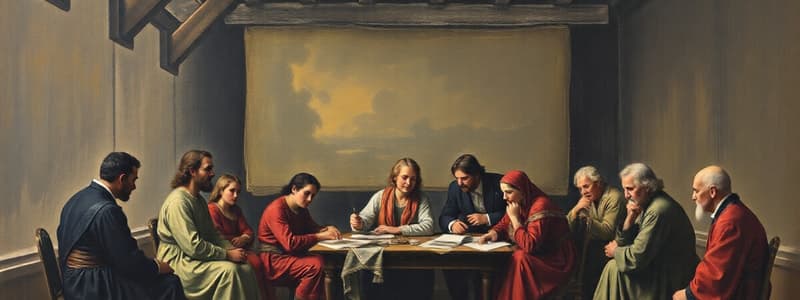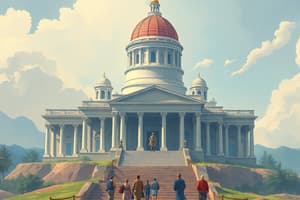Podcast
Questions and Answers
शासन रचनांचा मुख्य उद्देश कोणता आहे?
शासन रचनांचा मुख्य उद्देश कोणता आहे?
- सामाजिक संरचना बदलण्यासाठी नियम तयार करणे
- केवळ सरकारच्या आर्थिक व्यवस्थेमध्ये सुधारणा करणे
- शक्तीचे वितरण आणि व्यायाम कसा केला जातो ते निश्चित करणे (correct)
- राजकीय सिद्धांतांची समीक्षा करणे
जुने राज्यकीय मूल्ये आणि मानके कसे विकसित होतात?
जुने राज्यकीय मूल्ये आणि मानके कसे विकसित होतात?
- राजकिय चळवळींच्या प्रभावाने
- सांस्कृतिक गतीमुळे
- तार्किक विश्लेषणामुळे
- इतिहासीय संदर्भांनी प्रभावित होऊन (correct)
केंद्रित शासकीय रचनेचे काय फायदे आहेत?
केंद्रित शासकीय रचनेचे काय फायदे आहेत?
- नागरिकांच्या सहभागाची कमतरता
- पोलिस चौकसपणा वाढणे
- कार्यान्वयनातील कार्यक्षमता (correct)
- संशोधकांमध्ये जास्त विविधता
राजकीय सिद्धांत का महत्त्वाचा आहे?
राजकीय सिद्धांत का महत्त्वाचा आहे?
सार्वजनिक सहभागी कार्यक्रमांचे उद्देश काय आहे?
सार्वजनिक सहभागी कार्यक्रमांचे उद्देश काय आहे?
न्यायपालिका, कार्यकारी, आणि कायदेमंडळ यांच्यातील संबंध कसे निर्धारित केले जातात?
न्यायपालिका, कार्यकारी, आणि कायदेमंडळ यांच्यातील संबंध कसे निर्धारित केले जातात?
गवर्नन्समध्ये ब्यूरोक्रसीची भूमिका काय आहे?
गवर्नन्समध्ये ब्यूरोक्रसीची भूमिका काय आहे?
राजकीय विचारधारेत अधिकार, शक्ती आणि न्यायाचे कोणते मुख्य प्रश्न समाविष्ट आहेत?
राजकीय विचारधारेत अधिकार, शक्ती आणि न्यायाचे कोणते मुख्य प्रश्न समाविष्ट आहेत?
Flashcards
Polity Definition
Polity Definition
Polity is how a political system is organized, including its institutions, power, and decision-making.
Governance Structures
Governance Structures
Governance structures show how power is shared and used in a political system, including different levels of government and their roles.
Decentralization/Centralization
Decentralization/Centralization
These describe how power is spread out or concentrated in a political system.
Branches of Gov't
Branches of Gov't
Signup and view all the flashcards
Political Theory
Political Theory
Signup and view all the flashcards
Political Thought
Political Thought
Signup and view all the flashcards
Comparative Polity
Comparative Polity
Signup and view all the flashcards
Citizen Participation
Citizen Participation
Signup and view all the flashcards
Study Notes
Polity
- Polity refers to the organization and structure of a political system, encompassing institutions, power relations, and the processes of decision-making.
- It encompasses the formal and informal mechanisms that govern a society.
- Key elements include the state, government, and the broader political culture.
- Polity is distinct from other aspects of society such as economics or culture. While interconnected, they operate with different dynamics.
- Comparative analysis of polities across different societies reveals variations in political structures, institutions, and processes.
- Historical contexts profoundly shape the development and evolution of political systems, including their values and norms.
Governance Structures
- Governance structures outline how power is distributed and exercised within a political system.
- These structures include various levels of government, such as local, regional, and national.
- They encompass institutions like legislatures, executives, and judiciaries, each with specified roles and responsibilities.
- The extent of decentralization or centralization significantly impacts the distribution of power and the operation of government.
- Different constitutional frameworks define the relationship between branches of government, specifying powers and checks and balances.
- Bureaucracies, often established for efficiency, can play powerful roles in governance, both in implementation of policies and influencing policy itself.
- Interactions between governmental bodies and civil society organizations (NGOs, interest groups) are a critical aspect of governance.
- Mechanisms for citizen participation in policy-making, such as elections, referendums, or public consultations, influence the operation of governance.
- Administrative procedures and processes are integral to governance; their efficiency and fairness impact effectiveness.
Political Theory
- Political theory explores fundamental questions about justice, power, rights, and the nature of the state.
- It offers frameworks for understanding and evaluating political systems and the actors within them.
- Key figures in political thought include Plato, Aristotle, Machiavelli, Hobbes, Locke, Rousseau, Marx, and many others throughout history.
- Theories offer varied perspectives on the ideal form of government, the nature of citizenship, and the distribution of resources.
- Concepts like democracy, liberalism, socialism, and conservatism are critically examined in political theory.
- Political theory frequently analyzes the relationship between citizens, the state, and the different principles of legitimacy and authority.
- Contemporary political theory examines emerging issues such as globalization, environmentalism, and inequality.
- Various approaches within political theory exist, such as normative (evaluative), empirical (descriptive), and conceptual (analytical).
- Interdisciplinary approaches—integrating political theory with other fields like philosophy, sociology, and economics—can deepen understanding.
- Political theory provides tools for engaging in critical reflection on political issues and evaluating policy options.
Studying That Suits You
Use AI to generate personalized quizzes and flashcards to suit your learning preferences.




